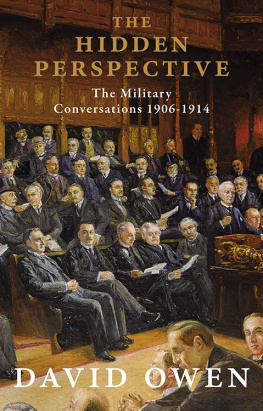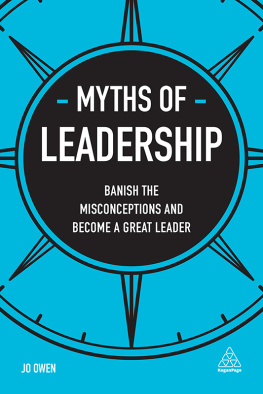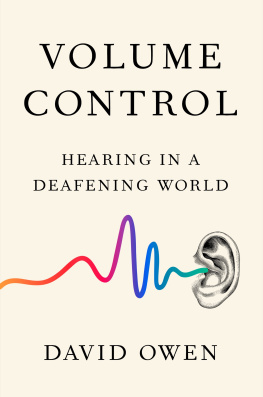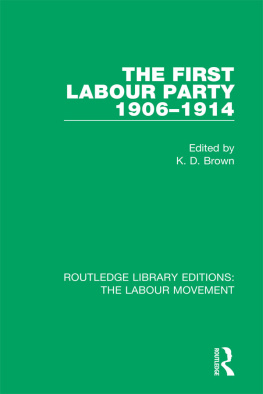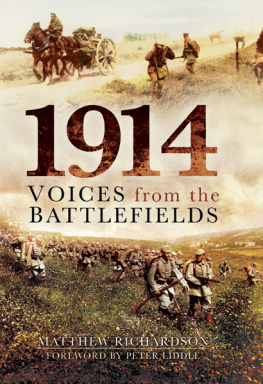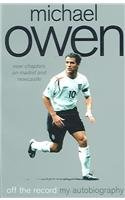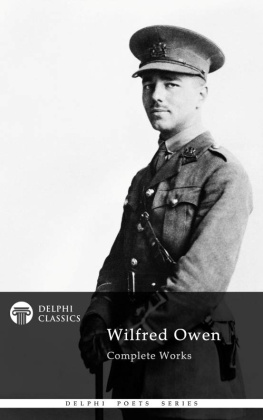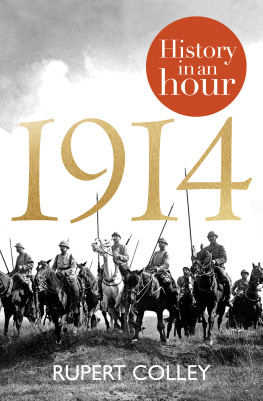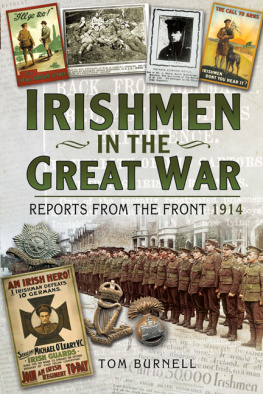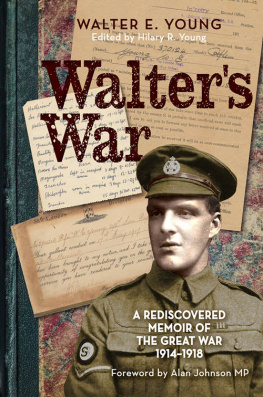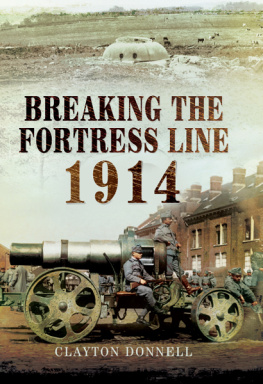Owen - The hidden perspective : the military conversations 1906-1914
Here you can read online Owen - The hidden perspective : the military conversations 1906-1914 full text of the book (entire story) in english for free. Download pdf and epub, get meaning, cover and reviews about this ebook. year: 2015, publisher: Haus Publishing Ltd, genre: Science. Description of the work, (preface) as well as reviews are available. Best literature library LitArk.com created for fans of good reading and offers a wide selection of genres:
Romance novel
Science fiction
Adventure
Detective
Science
History
Home and family
Prose
Art
Politics
Computer
Non-fiction
Religion
Business
Children
Humor
Choose a favorite category and find really read worthwhile books. Enjoy immersion in the world of imagination, feel the emotions of the characters or learn something new for yourself, make an fascinating discovery.
The hidden perspective : the military conversations 1906-1914: summary, description and annotation
We offer to read an annotation, description, summary or preface (depends on what the author of the book "The hidden perspective : the military conversations 1906-1914" wrote himself). If you haven't found the necessary information about the book — write in the comments, we will try to find it.
Owen: author's other books
Who wrote The hidden perspective : the military conversations 1906-1914? Find out the surname, the name of the author of the book and a list of all author's works by series.
The hidden perspective : the military conversations 1906-1914 — read online for free the complete book (whole text) full work
Below is the text of the book, divided by pages. System saving the place of the last page read, allows you to conveniently read the book "The hidden perspective : the military conversations 1906-1914" online for free, without having to search again every time where you left off. Put a bookmark, and you can go to the page where you finished reading at any time.
Font size:
Interval:
Bookmark:
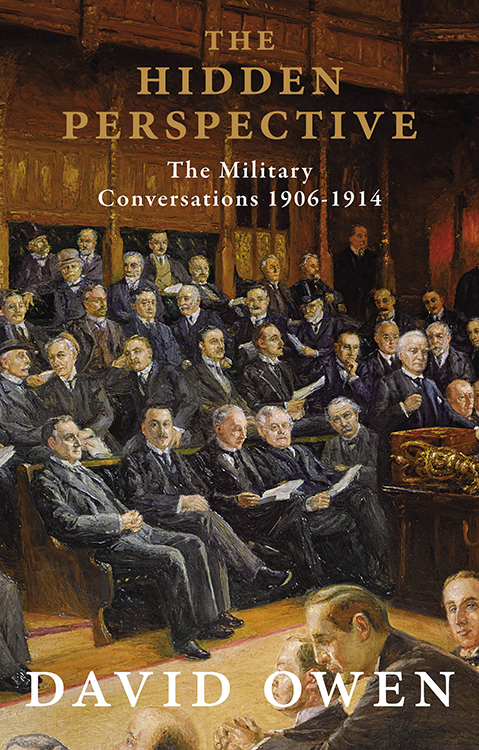
The Military Conversations 19061914
David Owen

T he Foreign Secretarys room in Whitehall with its big windows looking out west to St Jamess Park and north across Horse Guards Parade, particularly in the evening cannot but evoke, from time to time, for anyone who has been Foreign Secretary the memorable words of Sir Edward Grey on 3 August 1914. Speaking to a companion as he was watching the gas lights being lit in the street below he said, The lamps are going out all over Europe. We shall not see them lit again in our lifetime.
On my becoming Foreign Secretary in February 1977, my friend the late John Mackintosh, a fellow Labour MP, mentioned Edward Grey when congratulating me. I was not sure what he meant and he guided me to the warnings in Chapter Eleven of his brilliant book on The British Cabinet took precedence. Though I did deal in this book with the effect of alcohol on the decision-making of Asquith and the relevance of what I call acquired hubris syndrome on Lloyd George, particularly from 1919 to 1922.
In The Hidden Perspective I try to bring political experience to the scholarship and research of others. It contains quotes and actual documents exchanged amongst politicians, diplomats and the military, underpinning the Military Conversations and the Triple Entente involving France, Russia and Britain. Some of these documents are given in full, but the general reader can if they prefer be selective since I bring key words and sentences into the main text. Cross-referencing between Chapters Two and Three is inevitable because of the overlap between diplomacy and politics over the same time period.
Because I am by training a neuroscientist and because doctors of medicine have over the centuries used the post-mortem as a way of learning from their mistakes, I attach much importance to actual documents. In 1979, after the fall of the Shah, I established a year-long inquiry by the diplomat Nicholas Browne into British policy on Iran 197478, to learn the lessons of my mistakes and those of others. Senior diplomats have told me that this report, published in 2010, has been invaluable to them over the years. Two recent books analyse my own decision-making in foreign policy through documents, one on the British nuclear deterrent examines George W. Bush and Tony Blairs decision-making.
My paternal grandfather, a captain in the Merchant Navy, was killed in an accident aboard his ship during the First World War. My father served as a doctor in the Royal Army Medical Corps, attached to the 9th Lancers in the British Expeditionary Force in 1940. I have long wanted to understand about the 1914 British Expeditionary Force and whether there is much of a historical connection between what lay behind the disaster and the miracle that took place on the beaches of Dunkirk.
Many people have helped me, but a few need special mentions and my grateful thanks. First and foremost my cousin, Simon Owen, for much help working together in Greece. The Library staff in the House of Lords. The Bodleian Library, Oxford, for access to the Asquith and Harcourt papers and permission to print the Harcourt memo of 14 March 1912 in full. The National Archives. Much assistance from Maggie Smart over this and other books. Also Amanda Frost. To my publisher, Barbara Schwepcke, and all at Haus Publishing I am very grateful for many things but especially for coinciding publication with the Adam von Trott Lecture at the German Embassy on 18 March 2014.
The German historian Joachim Fest wrote about the resistance to Hitler: opponents of the regime came from various backgrounds: civil servants, clergymen, trade unionists, lawyers and professors. The officers were only the armed wing of the plot: they were to retreat to second place after overthrowing Hitler, and hand over political leadership to the country.
Limehouse, London, January 2014
On the idle hill of summer,
Sleepy with the flow of streams,
Far I hear the steady drummer
Drumming like a noise in dreams.
Far and near and low and louder
On the roads of earth go by,
Dear to friends and food for powder,
Soldiers marching, all to die.
A E Housman, from A Shropshire Lad (1896)
T his is not a book about the 191418 war but about the military and political impact on that war of conversations between the Chiefs of Staff of Britain and France that formally started in January 1906.
The total number of military and civilian casualties in the First World War was over 37 million. There were over 17 million deaths and 20 million wounded, ranking it among the deadliest conflicts in human history.
The dead numbered about 10 million military personnel and not quite 7 million civilians. The Entente Powers, Britain, France and Russia (also known as the Allies), lost about 6 million soldiers while the Central Powers, Germany, Austria and Hungary, lost about 4 million. At least 2 million died from disease and 6 million went missing, presumed dead.
Chapter One
G reat Britains geopolitical power base was weakened by the Boer War. When it started on 11 October 1899, some believed, as in 1914, that the Boer War would be over by Christmas. Yet it proved to be the costliest, bloodiest, longest and most humiliating war Britain had fought between 1815 and 1914. There were over 100,000 casualties of all kinds amongst the 365,000 imperial and 82,742 colonial soldiers who fought, and 22,000 of them were buried in South Africa.
The central tactical lesson of the Boer War, according to Thomas Pakenham, its historian, drawing on an article in the Journal of the Royal United Services Institute of December 1901 by Jean de Bloch, was that the smokeless, long-range, high-velocity, small bore magazine bullet from rifle or machine-gun plus the trench had decisively tilted the balance against attack and in favour of defence..
In her recent illuminating book The War That Ended Peace, Margaret MacMillan devotes much-needed attention to warnings of experts that offensives would end in stalemates with neither side strong enough to overcome the other, while societies were drained of their resources, from men to munitions.
Continental Europe had never experienced anything like the carnage of the Boer War. Its last war of 1870 had ended on 10 May 1871 with France having to transfer almost all of Alsace and part of Lorraine to Germany, but the Franco-Prussian War did not involve mass loss of life and devastation, though it contained within it the seeds of a continuing French fear and hatred of Germany. It was a war in which Great Britain deliberately avoided any involvement. Resentment still simmered in France over its defeat by Germany. The statue for Strasbourg in the Place de la Concorde remained draped in black. Every year those graduating from the French cavalry school went to the border to look down the slope in the Vosges mountains which they would charge down when, as they thought, hostilities would inevitably be resumed between France and Germany. For Great Britain there was no need to harbour traditional animosities from across the Channel. The most recent war Britain had fought in Europe was in the Crimea, and so although the French continued to distrust Perfidious Albion there was not the intense fear and hatred engendered by a combat with Germany within living memory.
Font size:
Interval:
Bookmark:
Similar books «The hidden perspective : the military conversations 1906-1914»
Look at similar books to The hidden perspective : the military conversations 1906-1914. We have selected literature similar in name and meaning in the hope of providing readers with more options to find new, interesting, not yet read works.
Discussion, reviews of the book The hidden perspective : the military conversations 1906-1914 and just readers' own opinions. Leave your comments, write what you think about the work, its meaning or the main characters. Specify what exactly you liked and what you didn't like, and why you think so.

